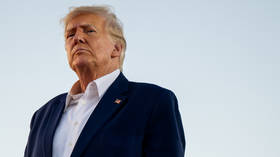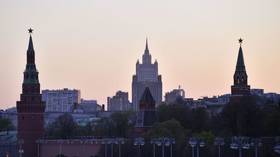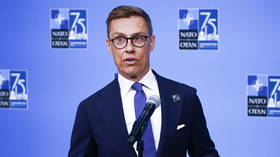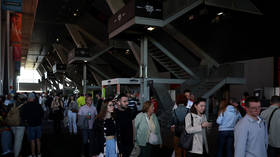'Wall St. favors Romney due to anger over Obama 'fat cats' remark'
Both Barack Obama and Mitt Romney get money from Wall Street, however, most big bankers support Romney. Even though Obama bailed them out, they remember the president’s “fat cat” remarks, The Nation magazine editor Katrina vanden Heuvel told RT.
RT:Katrina vanden Heuvel, editor of Nation magazine, it’s great to have you with us once again. So, all eyes are on the US election now, fingers are crossed on both sides because the candidates are running really close to each other in exit polls. What could become the decisive factor these days for either or?Katrina vanden Heuvel: You know, the national polls show Mitt Romney and President Obama running neck and neck, but if you look at the nine states where the election will be decided because of our system, the electoral college, Obama is still leading in many of those polls. I think the hurricane might play a role, because Obama has proven himself a decisive leader in dealing with the crisis, and the economy is slowly improving. The economy, of course, is the number one issue on Americans’ minds. I think he will find a way to win this election.RT:Talking about the economy, I know it sounds like a simple question, but which of the candidates has a better plan to get the US economy back on track?KH: There is no simple answer when it comes to the economy. As you know, there’s a world crisis. I believe President Obama has a better plan: he understands the need in the short-term to stimulate the economy. Remember he came in in what was the worst financial crisis since the [Great] Depression in our country. His recovery program helped create or save 2.5 million jobs. To invest in America today in the short term today and create jobs is very important. I think President [sic] Romney’s idea of cutting taxes for the richest, of deregulating, of giving more money to the military – more than our generals want – could very well send America back into the recession from which it is slowly emerging.RT:You’ve mentioned the stimulus package… The recession officially ended in 2009, with Obama in office. And at that point, even most conservative estimates said $3 to 5 trillion of stimulus was used for the bailouts. What does that exactly do to the whole principle of free market, which really made America – America?KH: There’s never been a free market, really, in any country. We’ve had a market, but the market has always had government investment. Now there’s a great hatred of government in America right now, the Tea Party has fueled that. But there are millions of Americans who understand there’s also a role for government, so there’s a battle underway in America for the soul, and spirit, and the politics of the country.RT:Another fact when we talk about the recession is that no bankers, no top financiers have been held responsible for the economic collapse in 2008 in the United States. So many people wonder, is that really because they’re not to blame, like Obama says, and Obama always sides with them and says prosecutors didn’t find them guilty and it means there’s nothing to prosecute them for? Or is it because the prosecutors could not be bothered to go through all that hassle to actually face the omnipotent financial system?KH: There’re two great disappointments with President Obama. One is that the banks were not held accountable for the crisis.RT:And they should have been?KH: They should have been held accountable. However, this piece of legislation the President Obama put forward called Dodd-Frank, it’s not very strong, partly because the banks lobbied against it and neutered it. But that is a disappointment, the banks should have been held accountable, at least there should have been demands put on the banks. However, there are prosecutors in America, e.g. the Attorney General of New York, who started civil suits, lawsuits against some of the big banks because of their fraud in the mortgage crisis, which is at the heart of financial crisis. You know, it’s crazy, because in America right now our oligarchs, our financial class, our business people, particularly Wall Street, are angry with Obama, when in fact he, like Franklin Roosevelt, saved the banks. He saved them from the excesses of capitalism.RT: Why are they angry with him?KH: Because once or twice he called them “fat cats”, because he said a few bad things about them… Their feelings are hurt. But I think, more than that, there’s a level of greed and arrogance among Wall Street now that they don’t feel that they should be touched, that they should be regulated. And that’s why Mitt Romney has become the candidate of Wall Street. That’s not to say President Obama is not getting money from Wall Street, but most of the big bankers are supporting Mitt Romney because they see him as an investment. As an investment, and if they put a lot of money in him it’s still a good investment on return because he will lower their taxes, deregulate and repeal Dodd-Frank legislation. RT:Well, I don’t really get why, because “inequality gap” is like a buzzword right now in the US media. There are estimates showing that in the last 20 years, by the way, with Republicans and Democrats equally, the real income of the top 1 per cent has been growing nine times faster than the real income of the lower 99 per cent.KH: I mean, the inequality gap, which President Obama does speak about, partly because of Occupy Wall Street and the 99 per cent movement which pushed him to speak about the greed and the recklessness of Wall Street and the inequality.RT:But is it an overrated issue, the inequality gap?KH: No, and it’s a terrible issue and you’re right that it has grown not only just under Republicans, but under Democrats, it is a bipartisan issue. Over this last 40 years worker’s wages have stagnated, and in the last two years 93 per cent of the income growth has gone to the top 1 per cent. This is a scandal, this is obscenity. But what’s also important, it is not only the revival of the middle class, which is under terrible stress, because to me it is the source of the healthy economy and country. But also what’s been scandalous in this election is what has not been talked about. You rarely hear about the poor: 15 per cent poverty in America today, one of the richest countries in the world. One in six children. You don’t hear about climate change or climate crisis. And you don’t hear about the militarization of our foreign policy. RT:Well, you mentioned oligarchs who put so much money in American politics and right before that you’ve mentioned the poor, who haven’t really been discussed in these elections. You see, for people who aren’t American it’s always been strange to look at how all these corporations, big companies are giving millions of dollars in donations to the presidential candidates. Because it really makes you wonder, how can you after that get a president who will actually stand for the interest of the poor or even the middle class?KH: There’s a great battle underway to try and get money out of politics, or to make sure that the system is such that the 99 per cent give small money and the 1 per cent is all restricted from all of this big money. President Obama has received millions of dollars, but it is the case that he and his party, the Democratic Party, have now said that, if elected, they will implement reforms like overturning Citizens United or “clean money”, so you reduce the big money in the system, whereas the Republican Party has obstructed or blocked any reform of such kind. They want to keep big money in the system. So there is a difference. And I would say that a recovery program that President Obama implemented had the largest share of anti-poverty money since the Great Society of 1965, which was when the war on poverty in America was at its height. RT:Do you think Obama was able to capitalize on the Occupy Wall Street movement?KH: I think Occupy Wall Street had a great impact on American political scene and on the President. Did he capitalize on it? I think the reverse. I think Occupy Wall Street pushed President Obama to speak in new ways, that he didn’t before, about inequality, about fairness, about the recklessness and irresponsibility of greed in America.RT:Who do you think these people will vote for?KH: Occupy?RT: Yes, because there’s another survey that says 81 per cent of Americans believe the government has not done enough to stop corporate wrongdoings.KH: Occupy, as you know, it was more a moral protest. Many of them, in Occupy, I think will not vote.RT: I want to touch a little bit on foreign policy, and I know that the candidates haven’t focused on it too much. That’s probably because you have so many economic and domestic problems to focus on. But every time an American president is elected it affects the rest of the world. And let me tell you how we see it at this point: we just wonder does it really matter if it’s a Republican or a Democrat, because we’ve seen every single president, let’s start with Clinton, let’s start with Yugoslavia, go and start a war in a different region. And even Obama, who got the Nobel Peace prize – you know, we see Afghanistan, Iraq, is not quite finished yet, we see drones killing people on the Pakistani border. Does it really make a difference for the outside world, whether a Republican or a Democrat wins? Because Libya also, a possible intervention in Iran and Syria…KH: I think it makes a difference. If President Obama is re-elected, I wish it would make much more of a difference, I think these similarities between the two parties are major, particularly the establishment of the Democratic Party and the Republican Party. Our country deserves better in terms of a different foreign policy. Less militarized, more in terms of seeking political solutions to conflict. But President Obama has ended the war in Iraq. Mitt Romney says he would’ve kept troops in Iraq. President Obama is beginning to end the war in Afghanistan and I think there would be a battle around that. And if Mitt Romney becomes President he may well stay there. On Iran, I think Mitt Romney is much more likely to side with the right wing of his new government in terms of military strikes in the region, which would be a disaster, even according to former heads of Shin Bet and Mossad. And I think in terms of Russia the relations are not good, but they would be worse under Mitt Romney, who by the way led Republicans on imposing arms control agreements, which Republicans for the last three decades have supported. I think in terms of Libya [sic], I wish there was more difference, but the Republicans want to arm the rebels. So I think on a whole series of issues I wish there was more difference. Mitt Romney has around him a lot of advisers who took us into the disaster of Iraq, the neo-conservatives. He has some realists, but the neo-conservatives could well win out. And I think President Obama could be pushed in ways Romney could not be. I think the escalation of the drone war is something the nation continues to speak out against. It is very dangerous, morally wrong, destabilizing and will lead to a backlash. And of course the counter-terrorism policies are for the most part the continuation of the Bush policies, which is tragic. Because I think President Obama wants to find a way on this war on terror, but while we’re still in it, it is very tough to talk in a different way, because Americans…RT: It is such an abstract war, it doesn’t really seem like…KH: Well, it shouldn’t be a war, you know very well. To fight a terror it should not be a war. You cannot fight a military war against a tactic – you have to find political and other ways to deal with it. And the more we fight it in military ways in America, the more we create more militants and anger and backlash against America. So I think part of what’s going on is also a global economic picture. I think Mitt Romney would be worse, I think he would bring to America what we see in Europe. His program is “Austerity Light” and if it starts slashing spending and tax cuts for the rich, you could see something comparable to the disaster we see in Greece, in Spain, in Italy. And that, I think, is very frightening. Whereas Obama, I think, would continue to try and inject some stimulus into the American economy.RT:Right, let the best one win. Katrina vanden Heuvel, thank you very much for this interview.













